- 当前位置:
- 首页>
- 活动>
- ������������
������������
CCG持续关注国际关系议题,推动中国与全球化的发展,积极开展国际交流,充分发挥智库“二轨外交”作用,在巴黎和平论坛、达沃斯世界经济论坛、慕尼黑安全会议等重要国际政策与意见交流平台上组织分论坛、边会、圆桌会议、晚宴等活动,促进国际政商学界对话,凝聚共识;CCG积极与各国政界、智库界、工商界开展“二轨外交”活动,每年常态化赴多国调研与交流,促进中外关系攸关方互动,保持与多国政策圈层的沟通渠道。
-

【CGTN】Chinese abroad defend globalization by fusing civilizations
Forty years ago, China embraced reform and opening-up. As part of the groundbreaking policy, then Chinese leader Deng Xiaoping, the primary architect of China’s economic reforms, started sending Chinese students and scholars overseas to further their study every year since 1978. Over the past four decades, the overseas Chinese population has mushroomed on the base of the first batch of 3,000. Since then, they have contributed to phenomenal developments in high-tech, new disciplines, and key industries, largely revving up China’s modernization drive.Now that dramatic changes are taking shape on the global landscape to feed growing pessimism about globalization, how can they cope with challenges ahead and continue contributing to the common development of mankind in the next four decades? Follow CGTN Digital to explore the views of influential scholars who studied abroad during the early stage of China’s reform and opening-up, at the annual conference of the Western Returned Scholars Association hosted by the Center for China and Globalization (CCG).Group photo of participants, mostly the fifth generation of overseas Chinese students and scholars, at the 13th annual conference of the Western Returned Scholars Association in Beijing, August 19, 2018. /CCGZhao Suisheng, director of the Center for China-US Cooperation at University of Denver’s Josef Korbel School of International Studies, and founder of Journal of Contemporary ChinaI belong to the fifth generation of overseas Chinese students. I went to the US in the mid-1980s and spent 33 years there since then. Members of the fifth generation are actually beneficiaries of the reform and opening-up policy and also the globalization trend. We are supposed to stay committed to furthering domestic reform and ratcheting up globalized development, which is a tough mission in the present-day world.Some experts talked about the Donald Trump revolution. I don’t know whether he waged a revolution or not, but I know clearly that he initiated anti-globalization, which has now morphed into a movement. How to fight the anti-globalization force has become a new major task for us. We shall continue learning from other countries and improving ourselves so that China will have a bigger say in global governance.US President Donald Trump participates in an event honoring border enforcement agents and Immigration and Customs Enforcement officials in the East Room of the White House, Washington, DC, August 20, 2018. /VCG PhotoPan Qingzhong, executive dean of Schwarzman Scholars Program at Tsinghua UniversityActually, all Chinese, from government officials to the general public, have a common ideal: a fusion of civilizations and progress for mankind. The past four decades and the future four decades are part of the long-drawn history of human civilization.No matter where we go, we shall bear in mind the importance of understanding different peoples and cultures. Over the past years, an increasing number of Chinese have been to places that need them most, like migratory birds, not only to the US and Western European countries. When I visited Nigeria, Kazakhstan and several other nations on the Belt and Road, I found many senior staff from Chinese corporations working there. So it’s fair to say that where there is a market, there is talent.Statistics reveal that around 60,000 Chinese students went to countries involved in the Belt and Road Initiative for further study. They will have a variety of diversified opportunities in the future.Abuja city in Nigeria /VCG PhotoHua Xinghong, managing director and head of China at Cerberus Capital Management LPThe moment humans ventured out of Africa (60,000 years ago), globalization began. The process is long and painstaking. Today, we witness a very glorious fusion of civilizations built up by a population of 7.6 billion. So communication plays a crucial role in binding us together and making us stronger.Forty years ago, my fellow peers and I went to the US to further our study. We studied hard and worked laboriously, first to survive and later to realize our dreams. We have now either returned to start our own business or contributed to American society. It’s actually an interaction process that has benefited both sides.A monitor displays Caterpillar Inc. signage on the floor of the New York Stock Exchange (NYSE) in New York, on Monday, August 20, 2018. /VCG PhotoAt present, the unfolding trade war must be what concerns Beijing and Washington the most. However, it’s not a bad thing for it showcases that we have grown stronger – the Chinese nation, people and culture have grown stronger so that the world’s biggest economy starts to value us, whether it takes us as a healthy competitor or a warring enemy. We have reasons to be proud of our achievements in the past four decades.But we still need to improve on our soft power. In the next 40 years and even in the next century, China will be in a flourishing age. An important task for us is to have more respect and understanding of other cultures while clinging to our soul. Without diligence, tolerance and willingness to learn, which are the traditional merits of the Chinese nation, we will not gain respect from others and will encounter obstacles in tangible areas.In the era of globalization, accentuating our individuality is becoming increasingly important. In the face of prevailing protectionist measures, we should cherish the tradition of accommodating different civilizations and learning their advantages. When we can consider the perspectives of others, we will make greater, more sustained contributions to the world.From CGTN,2018-8-21
2018年8月22日 -
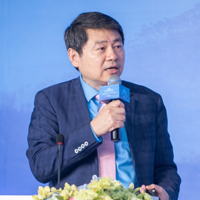
北青报 | 鼓励更多非政府组织参与全球治理
本文为全球化智库(CCG)主任王辉耀评论文章,文章刊发于2018年 8月19日《 北京青年报》第A2版 日前,全球化智库(CCG)被联合国经济与社会理事会(ECOSOC)正式批准授予非政府组织“特别咨商地位”,成为中国为数不多获得该地位的纯民间组织和智库,将享有参与联合国相关事务的权利和便利,在全球治理上发出中国社会智库的声音。 目前,我国参与全球治理的非政府组织数量较少,参与水平也较低,没能发挥应有的作用。仅以联合国经社理事会为例,在目前获得咨商地位的5163家非政府组织中,仅有82家来自中国(含港澳),而美国共有1680家,英国有366家,印度有348家。这与我国的国际地位并不相称,不利于我国全面参与全球治理。 随着全球化深入发展,世界各国更加命运与共、休戚相关,气候变化、恐怖主义、难民潮等众多全球性问题迫切需要加强全球治理。不同类型的治理主体共同协商合作,发挥各自优势解决全球性问题,已经成为全球治理的一个重要特点。 相比政府组织,非政府组织在参与全球治理上有很多优势。一方面,非政府组织注重从全人类的角度来关注全球性问题,并聚集了一批相关领域的专业人士,且贴近基层。这可以使非政府组织提出许多未被广泛认识到的全球性重要问题,并为这些问题的解决提供第一手的信息和专业人士的建议。 近年来,越来越多国家和国际组织将非政府组织提出的全球性议题纳入议事日程,提升了相关领域的全球治理水平。还有很多有潜力的国际民间组织比如国际人才联合会、国际网络组织、国际电商等,在一些新兴的空白领域可以更好地发挥民间专业组织的作用。 另一方面,由于非政府组织独立性、民间性、灵活性的特点,更容易得到其他国家政府、公众的信任,从而建立起沟通渠道。例如,在旷日持久的世界贸易组织多哈回合谈判中,发展中国家和发达国家在许多方面都难以建立起信任,进行建设性沟通,而最终达成的协议有许多都基于非政府组织提出的主张。此外,推动非政府组织参与全球治理,也有助于培养国内民众关注人类命运的国际意识,消解狭隘的极端民族主义情绪。 中国民间组织发展的现状相比其他国家还有很大的提升空间,同时也要看到,随着近年来中国经济快速发展,民间组织也越来越活跃,各种商业的、公益的、专业的民间组织迅速发展。加之近年来中国在法律和制度上不断规范,加强了对民间组织的有效支持和管理,也让我国民间组织发展进入一个正规化的快速发展时期。 随着中国全球化程度日益加深,非政府组织“走出去”已经成为不可阻挡的潮流。而且,在中国提出构建人类命运共同体和“一带一路”倡议的背景下,也需要进一步重视和鼓励非政府组织发挥作用。 首先,要在全社会营造鼓励和支持国内非政府组织参与全球治理的氛围。目前,国人对中国海外援助活动的理解和支持还不够,今年年初成立国家国际发展合作署是一个契机,可在国际发展合作体系中合理纳入非政府组织的力量,进而提升民众参与国际事务的意识,涵养大国心态,吸引相关人才。 同时要协调好政府、企业、非政府组织之间的关系,尽快出台相关的规范,形成有效的合作机制。要注意保持非政府组织的独立性,但也要保证非政府组织参与全球治理的行动与国家的外交政策保持协调,实现可持续发展。 其次,国内非政府组织要提升自身能力建设,提升参与水平。毋庸讳言,国内许多非政府组织的国际化水平较低,难以满足参与全球事务的要求,而国外许多非政府组织往往通过向相关国家和国际组织提交陈述和咨询,出席会议进行游说,举行宣讲会,发表报告等多种形式发挥影响力,吸引国际舆论关注。对此,国内非政府组织要加强对国外非政府组织的学习,学习其设置、影响全球议题的方式。 再次,非政府组织的力量和声量一般相对较小,加强与其他政府间组织、非政府组织的合作,有助于提升影响力和自身国际化水平。目前除联合国外,国际劳工组织、国际移民组织、国际卫生组织、国际海事组织、国际民航组织、国际知识产权组织等组织都设立了非政府组织咨商制度。此外,金砖国家论坛、中非合作论坛等集体对话机制下都专门设置了一系列的配套活动,发挥非政府组织的作用。非政府组织应积极与这些组织建立沟通协作关系,推动中国非政府组织在参与全球治理中更好地展现中国形象、中国智慧、中国力量。文章选自《北京青年报》,2018年8月19日
2018年8月21日 -
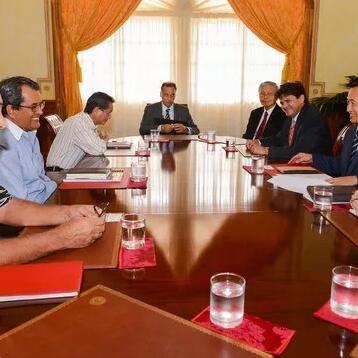
【Global Times】Island aid not ‘briefcase diplomacy’: expert
China sincere about building community of shared future in S. PacificChina’s increasing investment in South Pacific island states reflects the country’s sincere aspiration to build a community of shared future, Chinese experts said Thursday, dismissing an Australian think tank director’s remark that such assistance sometimes amounted to "briefcase diplomacy."China, according to a report published by the Australia-funded think tank Lowy Institute, is now the second-largest aid donor in the South Pacific, Reuters reported.China’s $1.3 billion in donations and concessionary loans since 2011 trails only Australia’s $6.6 billion, and already surpasses New Zealand’s $1.2 billion in a region traditionally dominated by the two Oceanic nations, according to data provided by the think tank.China’s assistance to the South Pacific island states covers various sectors including infrastructure, energy, agriculture, healthcare, emergency humanitarian aid and responses to climate change, Qian Feng, a senior research fellow at the National Strategy Institute of Tsinghua University, told the Global Times on Thursday.As these countries are actually in dire need of development, this also reflected China’s surgical assistance spirit and sincere aspiration of building a community of shared future, while effectively countering the groundless accusation that China is merely exerting influence and looting resources, Qian noted.Taking Fiji for instance, he said, China has assisted the South Pacific island state in building the Stinson Parade Bridge and Vatuwaqa Bridge, which eased traffic congestion.China has in recent years also implemented aid programs such as the Nabouwalu-Dreketi Road, Somosomo hydropower station, Juncao mushroom demonstration center and rice technical cooperation project.In February, China handed over vehicles to provide better service in education, healthcare and other sectors in both urban and rural areas, the Xinhua News Agency reported.The Reuters report cited Jonathan Pryke, the Lowy Institute’s Pacific Islands program director as saying: "There is definitely an element of briefcase diplomacy in the Pacific."Pryke suggested the number showed Chinese mainland jostling with Taiwan over aid money to cultivate diplomatic ties in a region home to countries’ holding "diplomatic ties" with Taiwan.Taiwan now has 18 "diplomatic allies," among which six are in the South Pacific.China should further boost assistance and exchanges with these countries, help develop tourism-related infrastructure to not only meet the Chinese people’s international travel needs but also more importantly, to substantially benefit the locals, Wang Huiyao, founder and president of the Center for China and Globalization (CCG), told the Global Times on Tuesday.Wang also suggested that collaboration between China and these relatively smaller island states in the region under the China-proposed Belt and Road initiative should be elevated, and will serve as successful examples to promote the initiative worldwide.FROM Global Times, 2018-8-9
2018年8月21日 -
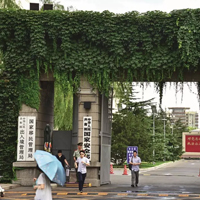
【 Vista看天下】中国“绿卡”新政后,华人成为主力军
万鸣宇 张惠兰 高璇 / 文穿白色T恤,扎马尾辫,刘璇抱着厚厚的文件袋,站在咨询台前,同女警官交谈。她笑起来有酒窝,一眼望去,并不像年过三十的母亲。实际上,她已有两个女儿,大的十岁,小的四岁,全都出生在加拿大,入了加拿大国籍。这是7月23日,刘璇来到北京市公安局出入境管理局中关村外国人服务大厅,正为小女儿申办中国“绿卡”。文件袋里装满了父母双方的身份材料以及女儿的出生证、护照及签证复印件......不过,她还是不确定是否齐全,也不知每份资料有无纰漏。女警官也拿不准,需要请示领导再通知刘璇。6月27日,北京,由武警站岗的公安部大门。国家移民管理局的牌子是4月2日正式挂上去的(@视觉中国网)刘璇在加拿大生活了十余年,拥有“枫叶卡”(加拿大永久居民卡),距离成为加拿大公民,只差一步。她是北京人,独生女,求学出国。到如今,父母年事渐长,需要人陪伴、照顾。两三年前,她便考虑带着女儿一起回国。女儿是加拿大国籍,回国后,不但出入境等手续繁琐,想在国内上学,也有很多限制,这一直是她和丈夫头疼的事情。今年3月,刘璇的丈夫从网上得知与中国“绿卡”新政相关的消息后,立马告诉刘璇。3月13日,《国务院机构改革方案》公布,其中提出组建由公安部下辖的国家移民管理局。职能是协调、拟定移民政策;负责外国人停留、居留和永久居留管理;承担移民领域的国际合作等。刘璇一直都知道这张卡片的存在。但在她的认知中,那是“非常,非常难申请的”。但这次政府机构调整,让她看到一些希望,她毫不犹豫地带着女儿飞回北京。飞回国内的不只是刘璇,已经移民国外的众多华人,同样被移民管理局的消息吸引了。改革开放后,很多中国人曾想尽办法,通过留学、技术、投资等各种方式,移民国外。现在,他们当中的一些人,又去到各地出入境管理局,咨询、申办中国“绿卡”,希望能获得在中国的永久居留权。“有种井喷的感觉”刘璇是2001年出国的,到现在已经17年。她还记得,刚到加拿大时,大陆移民地位很低,很多香港、台湾地区过去的移民看不起他们。最近几年,情况发生了变化,“近几年,一说中文,好像大家都认为你挺有钱。”现在,刘璇发现,这些“有钱人”又在返回中国。她有一个朋友,妻子和女儿已经入籍加拿大,他事业在国内,于是一家人长期两地分居。女儿在加拿大上学几年,妻子实在待不下去,拿到身份后,带着女儿又回到中国来上学,现在也在为女儿办中国绿卡。据刘璇了解,这种情况并不少见。很多中国人移民国外,主要事业、社会关系都在中国。于是妈妈陪读,爸爸像太空人一样两地飞,“好多陪读妈妈不是特别愿意为了孩子牺牲家庭,或者牺牲自己的事业,入了籍以后,就又回国了。”“现在,申请最多的就是华人。真正的外国人不多。”某市出入境管理局工作人员李佳欣接受本刊采访时说,之前申请“绿卡”限制很大,能拿到的非常少,新政之后,大大降低了中国“绿卡”的门槛。工资、税收两项达到一定数额,满足居留时限要求等,都可以直接申请。事实上,早在国家移民管理局成立之前,“绿卡”的政策就在放开。2017年,公安部宣布,在天津、湖北、重庆等自贸区,以及京津冀、广东、四川等省市,推出入境新政,为外籍华人在华居留和永久居留提供更大便利,吸引外国留学生来华创新创业,为长期在华工作人员提供居留便利,为外籍人才提供入境便利等。据李佳欣介绍,通常,外国人获得中国“绿卡”的方式一般有五类——投资、任职、特殊人才,以及亲属团聚和投靠。此前,利用亲属团聚申请者最多,现在,以拥有博士学位的学者、行业专家、获得政府相关部门推荐的高精尖人才为主,人数与过去相比,“有种井喷的感觉”。对此,上海费戈曼商务咨询有限公司合伙人夏凌华颇有同感。费戈曼成立于1951年,全球设有40多家办事处,为170多个国家、地区提供移民咨询服务,早在中国“绿卡”制度建立之初,他们就开始提供相关业务咨询和办理。“申请中国绿卡的人数一直处于递增趋势。”接受本刊采访时,夏凌华介绍,从2016年起,客户的咨询量跟之前相比涨幅高达40%—50%。今年以来,来公司咨询的华人比例明显增加,占绿卡咨询总数的50%。当下,海外华人华侨总数超过6000万。约六分之一是改革开放后走出中国的新移民。移民的主要目的地为美国、加拿大、澳大利亚。在《新民潮:中国怎样才能留住人才?》一书中,中国与全球化智库(CCG)理事长王辉耀写道,在美华人已经突破400万,其中,近350万加入美国国籍,大部分是高精尖人才。中国一度是世界最大的人才流出国。随着“人才强国”战略实施,中国从中央到地方,各级政府都出台了引进海外高层次人才来华发展的计划。2008年,国家“千人计划”出台。截至2017年底,已分13批引进7018名海外高层次人才。其中,绝大多数为华人。以2011年7月入选南京“千人计划”的海外专家为例,48人全部为华人、华侨。今年四月以来,李佳欣便受理了多位外籍华人博士的绿卡申请。接受本刊采访前一周,多数申请已成功获批。在她日常接触的外籍人士中,日本、韩国派驻的外籍人才,一般在中国停留四年便会离开。“欧美人可能会觉得中国适合居住,但很少考虑定居”。也有一些相对年轻的留学生,他们在国外遭遇排挤、限制。相较之下,会觉得国内的资金充裕,创业的条件也好,政策开放。当地新政出台前,李佳欣曾遇到一对高知夫妇。两人都是博士,以亲属投靠方式申请“绿卡”。材料递交了两三年,“绿卡”却一直没批下来。“他们也不灰心,就不停地交申请,递材料。”最后没办法,正巧碰上其他省市出台出入境新政策,两人从李佳欣那里撤销申请,转投到其他省份。最大的优势李佳欣偶尔在网络上回答网友出入境相关的提问。在一条外籍华人博士如何申请中国“绿卡”的帖子下,她提及近期成功受理华人博士绿卡申请的案例,引来不少人咨询。7月份,在英国工作的王皓,也留言询问绿卡的事情。他已经在英国获得博士学位,而且有机会加入英国国籍。但他一直在犹豫、权衡。他长期关注着中国“绿卡”新政动向。在李佳欣的帖子下留言,他特意询问籍博士申请中国“绿卡”能否在海外办理。显然,对很多人来说,放弃中国国籍,并不是一件容易的事情。中国“绿卡”新政,给很多移民国外的华人,提供了多一种可能性。刘璇在加拿大接触到很多朋友,要么是保留中国国籍,拿了加拿大绿卡,“像我这样”,刘璇说,要么是直接加入加拿大国籍,再计划拿中国绿卡,“回来以后就没有限制了”。王辉耀在《国家移民局》一书提到,与此前单纯关心出入境问题不同,如今,环境、生活便利性、社会福利、人文关怀等问题,已经成为外籍人才来华工作关注的新热点。提及中国“绿卡”的含金量,夏凌华认为,这也是申请绿卡的外籍人中华人比较多的原因。她的客户中除了外籍华人,还有来自欧美等发达国家的外国人,但他们申请绿卡,主要是为了方便,“这些本身就来自发达国家的外国人,来到中国,对国民待遇问题就不太感兴趣。”在日本生活22年后,长海博文回到江苏,担任苏州大学特聘教授,同时还在中国铝业、苏州有色金属研究院等机构任职。“虽然我还是外籍,但回到国内,国家却能给我国民同等待遇。”长海博文撰文回忆道,2011年11月,首批21位外籍人士获得了江苏海外高层人才居住证,自己就在其中。获得这一证件后,他不但能够申请各种各样的国内科研资金、项目,还能在事业单位担任领导职务。长海博文坦陈,“这一点,是对我们海外回来的最大支持。”各省推出的海外人才居住证制度,亮点之一是将“绿卡”的身份证件功能与当地的优惠政策结合。比如,浙江海外高层次人才居住证,获得者除了可以享受买房、子女教育等相关福利,针对浙江创业的经济特点,持证人还可以技术入股,以商标、著作权、专利等知识产权出资等方式创办企业。虽然女儿在加拿大成长,但在刘璇看来,她回国读书,最大的优势并非语言,而是在高考问题上。“如果你是外籍,在中国一直读书,你可以在中国参加高考”,刘璇说,关键在于,外籍学生迈入国内顶尖大学的门槛要低得多。此前北京师范大学留学生办公室接受《中国青年报》采访时,也曾透露,北师大通过自主招生的方式招收留学生,“他们向我们提供有关材料,再参加比较简单的测试。”不过,刘璇回国,主要并不是为了孩子,而是为了父母。她是80后,“我们这代人独生子女比较多”,刘璇说,父母现在年龄大了,缺少人照顾,她想过为父母申请加拿大那边的移民,但要求比较严格,父母也不愿放弃中国国籍,他们只好考虑回来,“孩子年龄大一些,她们愿意回去,还可以回去。”每个人回来的原因都不一样,但对很多老人来说,故土感情确实是很常见的原因。李佳欣在处理“绿卡”申请时,碰到过很多五六十岁,在国外工作了大半辈子,如今通过“人才计划”回国的华人,“华人有落叶归根的感觉”。在吸引海外人才归国的问题上,海外华人、华侨历来是工作重点。“外籍华人,是我们引进全球人才的绝对主力和重点人群。”国务院侨办专家咨询委员刘国福接受本刊采访时说,与生在国外的外籍人士相比,华人更容易被吸引回国,他们“对中国有千丝万缕的思乡情结”。(刘璇、李佳欣、王皓为化名。本刊记者陈光对本文有贡献。) 一场特殊的座谈会2018年3月12日,日本亚洲通讯社社长徐静波作为中国“两会”海外特邀代表在北京铁道大厦酒店,参加一场座谈会。与会者包括公安部、国家出入境管理局、国侨办等机构的官员,目的是听取海外侨胞关于华侨政策的意见。据徐静波回忆,座谈会现场,一些华人、华侨提到了“华裔卡”的问题。“这个事情讨论了很多年了”,徐静波说,很多华人、华侨希望政府能针对已加入外国国籍,以及长期居留海外的侨胞,发行“华裔卡”,以方便他们回国,在国内办理各项事务。2016年,北京实施《公安部支持北京创新发展的20项出入境政策措施》时,北京中关村管委会主任郭洪就曾谈及这个问题,他表示,为吸引国际科技创新人才,中关村将试点移民入籍、华裔卡、外籍人员临时身份证制度。这个消息传出,立即在海外华人圈引发热议。但随后,中关村专门通过媒体公开澄清,华裔卡相关政策尚处于调研阶段,还有待于国务院、公安部等机构审批。在这次座谈会上,公安部官员再次回应了这个话题。“目前不具备发行条件”,徐静波向本刊回忆道,华人华侨虽然数量庞大,但管理上涉及不同部门,情况比较复杂。公安部官员也承诺,在中国工作华人申请绿卡问题,会降低门槛,放宽条件。而针对华侨回国使用护照的问题,也将会把护照纳入国民信息系统,以保证护照在国内办事能够通用。“中国的护照其实有两个部门在发”,徐静波说,在这次座谈会上,相关人员也介绍了这个情况,中国人第一次出国时获得的护照,一般是由公安部出入境管理局发放。出国后,很多人常住国外,护照用完或者到期后,回国不便,通常在中国驻外使领馆换发新护照。因此,中国的护照发放与管理,出现了公安部、外交部两个系统。由于这两个系统的护照信息并没有在国内实现完全联网,因此,很多华侨回国时在住宿、换外汇甚至申办公司等问题上,常遇到很多麻烦。“上世纪80年代至90年代前半期,一些省市实施了一个出国人员必须注销户口,以身份证换护照的做法”,徐静波介绍道,当时的身份证不起什么作用,许多人都不在意。但现在,这些华侨频繁返回国内,没有身份证信息就非常不便。“我在日本听说过好几次,华侨带着日本人回国考察,到了酒店,日本人都办好入住手续,住进了房间,而这位领队的华侨却因为没有身份证而住不进酒店,因为酒店不认他的中国护照,要求他到派出所去开临时身份证明。日本人看不懂,你中国人回到中国来,怎么还这么麻烦?”徐静波自己就曾一直被身份证问题困扰,他在座谈会上,提出了这个问题,公安部相关人员承诺,要推进解决这个问题。但徐静波也知道,这个事情牵涉不同部门,想要推进,还是要耐心等待。文章选自Vista 看天下,2018年8月18日
2018年8月21日 -
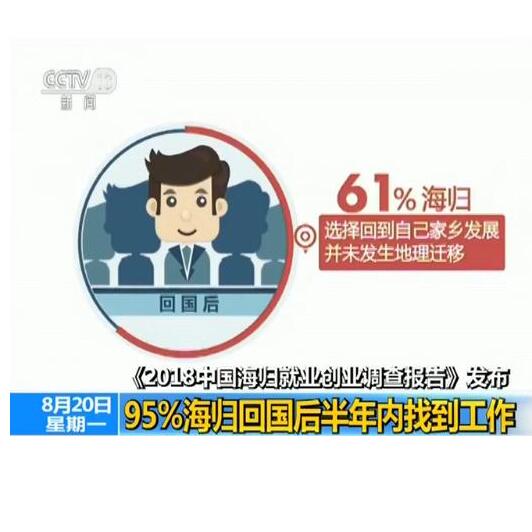
[朝闻天下]《2018中国海归就业创业调查报告》发布
央视网消息:昨天(19日)召开的第13届中国留学人员创新创业论坛发布了《2018中国海归就业创业调查报告》。报告显示,90后成为新生代海归的主体,占比高达55%。 《2018中国海归就业创业调查报告》通过2190份的有效问卷调查显示,新生代的海归群体出生年代集中在1985-1995年之间,其中,90后(1990-1995年)成为海归主体,占比高达55%,实际年龄在23-28岁之间。 欧美同学会副会长、全球化智库(CCG)主任王辉耀:现在回来的90后、甚至95后,开始呈这个增长的态势,既反映了这个留学潮,也反映了这个海归潮。那么中国留学生的这种大进大出,每年有六十多万留学生出去,有五十多万留学生回来,形成了中国独特的一个人才环流的现象。出国读本科的人越来越多 从海归群体获得的学位/学历看,硕士学位最多,占比达56%,其次是学士学位,占比38%,博士学位、专科和其他占比都在2%左右。与去年相比,硕士学位占比下降了6个百分点,学士学位占比上升了7个百分点,出国读取本科的留学生越来越多。英美仍为主要留学目的国 从最近一次留学国家/地区分布占比情况看,去英国和美国留学的人最多,占比分别为19%和18%。其中,女性更青睐英国,占比高达22%,其次是美国;而男性恰恰相反,21%的男性选择美国。 在最近一次留学中的主修科目中,经济学与商学类占比最高,达到43%。因此,金融业超过信息传输/软件和信息技术服务业,再次成为海归就业中最主要的行业领域。95%海归回国后半年内找到工作 曾经,有些海归因为在国内找不到工作,被称为“海待”。今年的《中国海归就业创业调查报告》显示,95%的海归都能在归国后的半年内找到工作,而国内的就业前景也更加吸引留学生们回国工作。 在出国留学的主要原因中,76%的海归是为了“体验他国文化、生活,丰富个人阅历”,而“计划未来在国外发展”的比例相对较低。所以,回国后,61%的海归选择回到自己的家乡发展,并未发生地理迁移。而迁移的人群中,有13%的海归迁往北京,8%的海归迁往上海,7%的海归迁往广东。 英国剑桥大学金融专业硕士 张彭丽:英国的情况(是)前一段时间因为脱欧的关系,其实很难留下来,即使留下来之后,工作的机会以及上升空间都会受到限制,所以当时就觉得还是早回来比较好一些,回国的话,事业上会有一定的成长性。 《2018年中国海归就业创业调查报告》显示,从就业状态看,72%的海归已就业,16%的海归正在找工作,5%的海归正在创业。但是总的说来,95%的海归都能在归国以后的半年内找到工作。其中,1个月以内找到工作的占比42%。而需要6个月及以上才能找到工作的占比仅为5%,海归找不到工作而待业的情况越来越少。 美国乔治华盛顿大学国际关系专业留学生杨希:对于我们吸引力最大的就是中国的发展空间,绝对是比其他的已经经济发展成熟的国家要多得多,增长空间要大得多。所以作为我们留学生来说,毕业之后,我第一选择还是可以回国进行工作。 欧美同学会副会长 全球化智库(CCG)主任王辉耀:现在有很多新兴的市场有很多的机会,比如说“一带一路”国家,比如说金砖五国,我觉得都会使海归人才在这个中间发挥越来越重要的作用。文章选自央视网,2018年8月20日
2018年8月21日 -
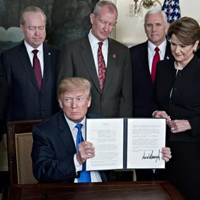
【Bloomberg】China, Unsure of How to Handle Trump, Braces for ‘New Cold War’
Perhaps nowhere outside America’s heartland is Donald Trump given more credit than in Beijing.In government offices and think tanks, universities and state-run newsrooms, there is an urgent debate underway about what many here see as the hidden motive for Washington’s escalating trade war against President Xi Jinping’s government: A grand strategy, devised and led by Trump, to thwart China’s rise as a global power.“The Trump administration has made it clear that containing China’s development is a deeper reason behind the tariff actions,” said He Weiwen, a former commerce ministry official and now a senior fellow at the Center for China and Globalization, an independent research group filled with former bureaucrats.Trump holds up a memorandum targeting China’s economic aggression in March 2018. Photographer: Andrew Harrer/BloombergThese sentiments were echoed by many of the more than two dozen current and former government officials, business executives, state-affiliated researchers, diplomats and state-run media editors interviewed for this article. Most requested anonymity to speak their minds about sensitive matters.A common suspicion ran through the conversations -- that the tariffs are just a small part of Trump’s plan to prevent China from overtaking the U.S. as the world’s largest economy. Several people expressed concern that the two nations may be heading into a long struggle for global dominance that recalls the last century’s rivalry between the U.S. and Soviet Union.“The trade war has prompted thinking in China on whether a new cold war has begun,” said An Gang, a senior research fellow at the Pangoal Institution, an independent research group in Beijing whose experts include former government officials. The dispute, he says, “now has military and strategic implications” -- reflecting concern among some in Beijing that tensions could spill over into Taiwan, the South China Sea and North Korea.The general pessimism is a major shift among China’s elite, many of whom had initially welcomed the rise of a U.S. president viewed as a transactional pragmatist who would cut a deal to narrow a $375 billion trade deficit for the right price. Now, with tariffs on $34 billion of goods already in effect and duties on another $216 billion in the pipeline, a majority saw no quick fix to a problem that is starting to rattle the country’s top leaders.‘Smart Negotiator’The turning point came a few months ago, when Trump put a stop to a deal for China to buy more energy and agricultural goods to narrow the trade deficit. Not only did that insult Xi, China’s all-powerful leader who had sent a personal emissary to Washington for the negotiations, but it crystallized a view in Beijing that Trump won’t quit until he thwarts China’s rise once and for all.“Donald Trump is a smart negotiator who has accumulated abundant experience in doing business for many years -- and also from the show ‘The Apprentice,’” said Wang Huiyao, an adviser to China’s cabinet and founder of the Center for China and Globalization(CCG), whose advisory council is stacked with former lawmakers. While “China is open to negotiations,” he said, Trump’s pressure tactics “will only arouse Chinese nationalism, which will be counterproductive.”The ramifications of that are now rippling through a society that has embraced America’s consumer culture -- Big Macs, Bentley cars and Chanel handbags are ubiquitous in Beijing -- even as it retains a one-party political system that champions large state enterprises and has little tolerance for dissent.A Bentley car at the Beijing Auto Show in April 2018. Photographer: Nicolas Asfouri/AFP via Getty ImagesThe trade war is leading to some soul searching in Beijing. Discussions quickly turn to the sustainability of China’s state-centered economy and the leadership of Xi, who can rule the country indefinitely after he led a successful effort earlier this year to repeal presidential term limits.Xi CriticismThe hushed debate centers over the wisdom of Xi’s goals for rapid growth and his decision to announce China’s ambitions to the world. This was a dramatic shift from former leader Deng Xiaoping’s famous dictum, “Hide your strength, bide your time.’’ Critics of Xi say policies like Made in China 2025 (a plan to dominate industries such as aircraft, new energy vehicles and biotechnology) and the Belt and Road Initiative (a mechanism to finance infrastructure investments around the globe) raised alarm in the West, and prompted the U.S. to target China before it could build critical technologies.This was seen by how swiftly Trump could bring down ZTE Corp., China’s second-largest telecommunications equipment maker. In April, his administration prohibited the company from buying essential components from American suppliers after it violated laws banning the sale of U.S. technology to Iran. The move prompted ZTE to cease major operating activities until Trump came to the rescue and helped engineer a settlement.Although ZTE is now back up and running, the episode showed China just how dependent the nation is on the U.S. for high-end know-how. It has also highlighted wider efforts to block Chinese firms from acquiring tech companies by the Committee on Foreign Investment in the United States, which reviews deals on national security grounds. All in all it amounts to “high-tech containment” of China, said Shi Yinhong, a foreign affairs adviser to the State Council and director of Renmin University’s Center on American Studies in Beijing.The U.S., of course, sees things differently. Officials have repeatedly said they don’t want to prevent China from growing, they just want to stop it from breaking the rules and stealing intellectual property -- allegations that officials in Beijing repeatedly deny.‘Off-The-Books Nonsense’The Pentagon recently named China and Russia as two U.S. rivals actively seeking to “co-opt or replace the free and open order that has enabled global security and prosperity since World War II.” Last month, U.S. Secretary of State Michael Pompeo obliquely criticized China for wooing developing countries with cheap financing for infrastructure projects, saying the U.S. believes in “strategic partnerships, not strategic dependency.”“With American companies, citizens around the world know that what you see is what you get: honest contracts, honest terms and no need for off-the-books nonsense,” Pompeo said in a speech before he attended a regional security forum in Singapore. Another advantage of the U.S., he said, is that “we will help them keep their people free from coercion or great power domination.”Across the political spectrum in China, from reformers to nationalists, there’s a growing consensus that the nation needs to open up more to foreign business, better protect intellectual property and create a more level playing field. The confrontation with the U.S. was “due in large part to China doing nothing for many years” to reduce the surplus, widen market access and ease state control, according to Shi from Renmin University. “China faces a new, uncertain situation and needs to undergo review and adjustment,” he said. “We didn’t consider other nations’ feelings in our strategic great leap forward.”Yet sentiments like these are tempered by a reluctance to be seen as bending to Trump’s demands. Several people said that at first they viewed the U.S. tariffs as not all bad if they prompted the government to make long overdue adjustments in China’s approach to doing business with the West. But as the trade war, and the war of words, has escalated, many of these same people are now digging in against the U.S., saying China won’t be bullied.Xi Jinping at the closing of the First Session of the 13th National People’s Congress in March 2018. Photographer: Giulia Marchi/BloombergApart from some criticism from academics and grumbling from unnamed officials, so far there’s little visible sign from China’s opaque government that the trade war has impacted Xi’s ability to control the levers of money and power. If Xi and his ministers are themselves suffering any doubts, it’s not reflected in the official press. The People’s Daily newspaper -- the main mouthpiece of the Communist Party -- recently confronted critics who say it was a mistake for China to be so public with its global goals.“Such a heavyweight cannot be hidden by taking a ‘low key’ approach,” the paper said in a commentary last week, “just like an elephant cannot conceal its body behind a small tree.”Beijing has signaled a willingness to strike a deal that narrows the trade deficit. But policy advisers see little room to budge on some of Trump’s other demands, including an end to subsidies for strategic industries, a stop to forced technology transfer and more competition for state-owned enterprises. Those stipulations -- shared widely by both Republicans and Democrats alike -- are seen as posing an existential threat to the Communist Party, whose legitimacy to rule hinges on its ability to improve livelihoods.Trump has tried to portray China as an adversary on the ropes, with a falling stock market, sliding currency and slowing economy. It’s certainly true that the U.S. economy is far stronger than China’s. But in Beijing, there is general confidence that in a test of wills between the two presidents, it’s Xi -- who doesn’t have to worry about elections or the wrath of special interest groups -- who can endure more pain.China has also hinted there are ways to turn up the pressure on Trump, if necessary. Tariffs on automobiles, semiconductors and Boeing airplanes aren’t off the table, according to Wei Jianguo, a former vice commerce minister and now vice director of China Center for International Economic Exchanges, a group with a mission to “improve China’s soft power.” While China is dependent on U.S. chips to make high-performance mobile devices and can’t completely cut ties with Boeing, it served as the second-largest market for American-made cars after Canada.“If you want to hit Trump hard, give him a right hook so he remembers the pain,” Wei said.The instinct to fight back comes naturally to China. The “Century of Humiliation’’ that followed the Opium Wars in the mid-1800s -- in which foreign powers forced China to open its markets and provide access to strategic ports -- is etched on the national psyche and used in Communist Party propaganda to spur nationalism.‘Most Dangerous Period’Nearly everyone interviewed in Beijing was looking ahead to the mid-term elections in the U.S. to see where things go next. While Standard Bank predicted on Aug. 15 that Trump would look to cut a deal before then to ride a stock-market surge to victory, the consensus in China saw a higher chance of a deal if the Republicans get walloped, as polls predict. China announced on Thursday that lower-level talks were set to resume later this month.“We’re talking to China, they very much want to talk,” Trump said Thursday at a cabinet meeting at the White House. “They just are not able to give us an agreement that is acceptable, so we’re not going to do any deal until we get one that’s fair to our country."Next to nobody is betting on a quick resolution. While Trump could tactically shift course at any time -- similar to what he’s done with Nafta, the European Union and North Korea -- with China he’s persistently ignored opportunities to lower tensions.“The U.S. and China are now in the most dangerous period in the past 40 years,” said Lu Xiang, an expert in relations between the countries at the government-run Chinese Academy of Social Sciences. “Mr. Trump put a knife on our neck. We will never surrender.”From Bloomberg,2018-8-17
2018年8月20日 -
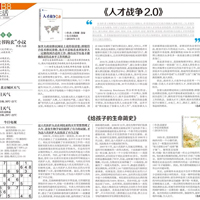
北青报图书连载CCG图书(三) | 《人才战争2.0》
《人才战争 2.0》 | 王辉耀、苗绿 著“本书作者王辉耀为全球化智库(CCG)创始人,作者苗绿为CCG联合创始人兼秘书长。《人才战争2.0》以未来为视角,介绍了目前人才流动的情况以及全球人才市场未来的趋势,并详细分析了美国、加拿大、澳大利亚、德国、法国、英国、日本、以色列、印度、俄罗斯、新加坡、韩国的吸引高端人才的举措和移民政策。作者根据他国的经验提出了很多切实可行的方案和建议,使我们在未来愈演愈烈的人才战争中占据有利地位。”加拿大政府移民网站上说得很清楚:即使符合技术移民资格,也并不意味着来到加拿大一定能找到合适的工作,拥有高学历也不能确保获得高水平工作的机会约翰·麦家廉加拿大原公民与移民部部长加拿大需要新鲜血液……我们没有足够多的新生儿,因此只能指望更多的移民来补充社会的劳动力。 —— 20世纪80年代,我从纽约转机到加拿大留学,成为所在大学的第一个来自中国大陆的攻读MBA和工商管理博士留学生。如今,在加国到处可以听见说普通话的人,吃到中国的地方风味,与三十多年前已不可同日而共语。2015年加拿大接受的移民存量为783.6万,占本国人口的21.8%,其中华人最多,约71万人,相当于每吸收十个移民中就有一个是中国人。 日渐增多的移民,与加拿大的人才战略不无关系。加国地广人稀,人口老龄化严重,二战后“婴儿潮”世代的人步入退休年龄,加之近四十年来出生率又低,本地出生人口满足不了劳动力市场需求。因此1962年颁布了新的《移民法》,规定,任何人,不管种族、肤色及来源国,只要他们拥有适当的资格并且能够在找到工作之前有足够的钱养活他们自己,都可以移民加拿大,以在世界范围内吸收本国所需的人才。 2015年,加拿大自由党领袖小特鲁多担任总理后,强调“自由党就是移民的党”,要让加拿大重新成为欢迎且对移民开放的国家,配套措施是增加加拿大移民配额、增设签证中心、降低移民门槛等,力图吸引更多高质量人才移民加拿大,其中仅2016年就计划吸纳28万~30万海外移民。这背后是2015年加国人口仅有0.9%增长的现实,假如不引入移民而仅靠国民分娩,20年内老龄人口将远超青壮年。 Bloomberg Benchmark的分析师也指出,“(2016年)加拿大人口已经达到一个分界点,如果没有年轻的移民人口,就不会出现增长”。加拿大统计局的就业数据也显示,2015年移民的就业数字增加,而本地出生的人士就业率下降。这并不是“移民偷走了加拿大人的工作”,而是加拿大人年龄渐增退出职场所致。新移民的失业率仍然较高,抵加不到5年的高达11.6%。失业背后是移民家庭的不幸故事,典型案例是2006年44岁的华裔博士蒋国兵从多伦多一座高速公路立交桥跳下自杀身亡。 蒋是清华硕士、美国核物理学博士,移民加国后却只能在一家油漆厂打工,再进入多伦多大学读博士并做博士后研究后仍找不到专业工作,面临必须放弃专业做蓝领的局面,他最终忧郁成疾自杀。这是人才流动中造成“人才浪费”以及“三输”局面的典型案例,耐人深思。 因此,政府在人才战争中必须思考一个重要问题:引进人才必须与使用人才、国家实际需求相结合。 加拿大政府移民网站上说得很清楚:即使符合技术移民资格,也并不意味着来到加拿大一定能找到合适的工作,拥有高学历也不能确保获得高水平工作的机会。加拿大对于工程师、程序员的需求,远低于对餐饮工、水电工、木工、清洁工、建筑工、司机等蓝领的需求。文章选自《北京青年报》,2018年8月16日
2018年8月20日